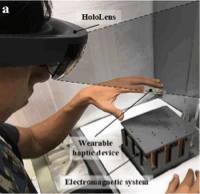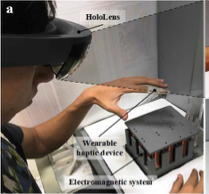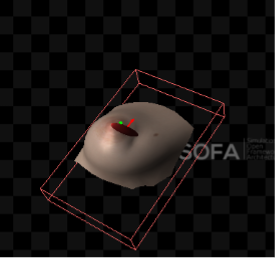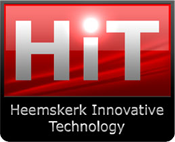
SOFA–Unity Integration: Advancing an immersive VR and Haptic Feedback simulator
BSc/MSc Student Assignment
Background
Breast cancer is the most common form of cancer among women in the Netherlands, with approximately 18,000 diagnoses annually. Surgery, radiation and chemotherapy are important treatment options, but the chance of success of these interventions significantly increases with a timely diagnosis. The Netherlands has a breast cancer screening program for this purpose. In younger women, who have not yet received an invitation for the screening program, diagnosis is often via a “lump in the breast”. Detecting this using external feeling of the breast (palpating) is therefore crucial. Palpation also plays an important role in further diagnosis and drawing up a treatment plan. Diagnosis is complex and requires a lot of training, normally done with dummy breasts. HIT is pursuing the development of a high-fidelity haptic-VR simulator. This simulator will ultimately be used to train students and medical personnel in recognizing and diagnosing early-stage breast cancer through virtual palpation using a haptic input device.


Objective
The simulator will use a combination of the unity game engine in addition to the SOFA framework. The goal of this assignment would be to enhance the SOFA-Unity integration through custom plugins, enabling real-time synchronization between SOFA’s soft-body simulation and Unity’s interactive environment. This system will ultimately support gamification for a more engaging training experience.
Responsibilities
Research and Setup
- Study SOFA and Unity integration methods, focusing on SOFA’s API for physics-based simulation and Unity’s VR capabilities.
- Familiarize yourself with plugin development in C++ (for SOFA) and C# (for Unity).
Development and Integration
- Develop custom SOFA plugins to enhance the API’s flexibility for Unity-based applications.
- Implement bi-directional communication between SOFA’s simulation engine and Unity’s scene.
- Enable user-controlled interactions and gamification elements in the Unity environment.
Documentation and Presentation
- Document your development process, key design decisions, and plugin functionality.
- Present progress and key findings in regular sprint reviews with the team.
Required Skills and Qualifications
Currently enrolled in Computer Science, Game Development, robotics, embedded systems, or a related field.
Technical Skills:
- Proficiency in C++ and/or C# programming.
- Familiarity with unity, game engines or physics-based simulators.
Soft Skills:
- Strong problem-solving and analytical abilities.
- Ability to communicate technical information effectively.
- Ability to work independently and as part of a multidisciplinary team.
Preferred Qualifications
- Experience with real-time physics or haptic simulations.
- Understanding of medical simulation.
Benefits
- Internship compensation: 400 Euros/month.
- Hands-on experience unity game engine and haptic integration techniques.
- The opportunity to contribute to an impactful, healthcare-related training tool.
